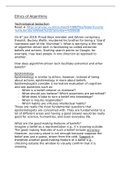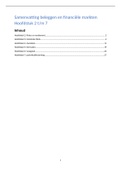College aantekeningen
Class notes on Ethics of Algorithms (W_BA_PNEU)
How can algorithm-driven technology facilitate extremist and other beliefs? What are epistemic bubbles and echo chambers? What are the good-making features of beliefs? How do you separate a rational from an irrational belief? Notes including theoretical examples and scenarios.
[Meer zien]





